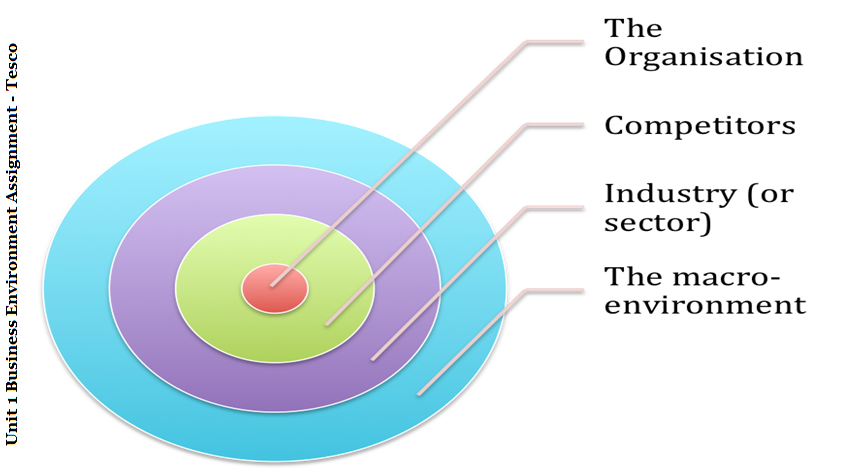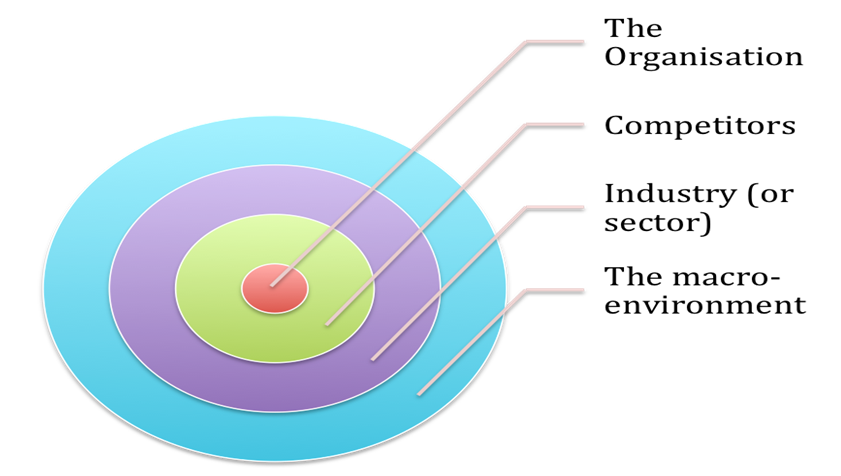- support@locusassignments.com
Unit 1 Business Environment Assignment - Tesco

|
Programme |
Diploma in Business |
|
Unit Number and Title |
Unit 1 – Business Environment |
|
QFC Level |
Level 4 |
Introduction
The business environment is ever changing however key aspects never change. The diagram below shows the business environment. Organisations have to be aware of their competitors, the industry as a whole and the wider environment. All of these factors affect the running of organisations and need to be studied as a result.
Lo1: Understand the Organisational Purposes of Businesses
Q1.1 Identify at least four different types of organisations that exist in the U.K.
There are different types of organizations present in the market. They have different purposes depending on their goals and objectives. Let us first understand what organizations for that matter are. Organizations are a set of people working with a common goal (Ross, 2008). This is a legal entity and enjoys and obeys rules and regulations just like any person in the constitution. In the organization, there are employees which help the organizations to achieve their objectives. They have their set tasks and their assigned jobs. There are many types of organizations. Let us identify 4 of them: Sole proprietorship, partnerships, corporations, and Limited Liability Companies (LLC). Sole Proprietorship is the organizations in which there is single owner. All the operation of the organization is looked after by the single person that is the owner. The owner also has the liberty to hire others to look after the business but the person responsible for all the activities done by the government will be the owner. In Partnership form of organizations, there is more than 1 owner as the name suggests. There are partners who own the business. Here the number of partners can range from 2 to many. All the decision made for the organization are taken collectively by the partners and they are responsible for all the business activities (Goodijk, 2002). The legal structure is like for sole proprietorship, the single owner is held responsible for all the activities of the company and for partnership all the partners are held responsible.
Click to know about Assignment Help Affiliate Program
Q1.2. Select an organisation of your choice and describe the extent to which this organisation meets the objectives of its stakeholders.
Tesco plc is the selected organisation to reflect the organisational duty toward stakeholders. Stakeholders are the interested parties who have concern about the organisation (Sternberg, 1997). Tesco has the following stakeholders: investors, lenders, suppliers, customers, government and employees, and the company have been in continuous attempt to meet their objectives.
- Investors: They provide the capital, which is required for the operation and survival of retail operation of Tesco. Because of their money involved in the company’s capital, the investors are worried about the rate of return. Tesco has to perform better to meet the investor’s expectations.
- Lenders: They lend money to the firm, and the company need to show the confidence in terms of performing better in order to pay the loan back.
- Suppliers: They form the primary source of company’s business activities. The firm needs to be consistent in terms of good payment arrangement.
- Customers: They expect quality service and products from the business; the organisations are expected to deliver according to the customer’s expectation. The customer surveys also have a role to play here.
- Employees: Their objective is to earn more money and get better salary. They are responsible for productivity of Tesco. The organisation needs to give them retirement benefits, better workplace opportunities and proper compensation.
- Government: Objective is to get taxes and govern industries. The organisations need to follow the legal guidelines, and pay the taxes.
Q1.3 Explain the responsibilities of the organisation you selected in Q1.2. In addition, explain the strategies employed to meet these responsibilities.
Besides doing business to generate profits, it is expected from Tesco plc to be dynamic enough in terms of fulfilling their other obligations towards the business environment in which it operates. Tesco has been known for its responsibilities, and the following four duties have been followed by the organisation:
- Social responsibility: The organisations should be responsible for the overall improvement of society. The customers expected the organisation to meet their expectation in terms of consumer happiness with better delivery of services and goods. Corporate social responsibility activities are carried out by Tesco in order to contribute towards society (Porter, 2006).
- Environment responsibility: It is important for the businesses to work towards increasing the responsiveness about using products which are environment friendly. Tesco has been working towards implementing various activities which are important for its brand image. The company is active in taking plantation initiatives and being responsible in nurturing environment oriented approach both outside and within the company. Tesco has been known its approach towards reducing the plastics usage through its retail outlets, minimising waste in the environmental structure, and decreasing the usage of hazardous materials in its product line.
- Employee responsibility: It is responsibility of the company to develop employee skills. Tesco works in the retail space, which needs a better approach towards employee development. The company works towards increasing the employability of the workers and maintaining a sound relationship between the organisation and employees.
- Government responsibility: Tesco follows the regulations laid by government authorities. Disclosure of vital documents and payment of timely tax is also very crucial. Tesco does this by employee and legal and environmental advisors.
Contact us
Get assignment help from full time dedicated experts of Locus assignments.
Call us: +44 – 7497 786 317Email: support@locusassignments.com
LO4: Be Able To Assess the Significance of the Global Factors That Shape National Business Activities
Q 4.1 You have been selected by the trustees of your local youth group to make a presentation to young entrepreneurs in the area on the importance of international trade to the local economy. Key to this is a discussion on the significance of international trade to UK business organisations.
In the globalised economy it is imperative to enlarge business operation outside the UK market. Operating at a global scale helps in accessing to wider choices of various resources necessary for business organisation. The practice of international trade means presence in more than one location across the globe. Following local business strategy may be helpful in understating the home market better with deeper knowledge about consume behaviour. The UK consumers often prefer British companies over the foreign sellers. However the local business practise confines the market opportunities and hinders the enormous growth opportunity. Global trade allows the organisations in better utilisation of available resources, which are present across diverse geographies. It offers chances use the workforce which has diverse characteristics. Importance of knowing international trade polices has been prioritise by the UK miming companies, such as Anglo American plc. Anglo American is a UK-based public company active in metals and mining operation across various locations in the world. The company uses its diverse production facilities in order to meet the expectations of its own business. Presence in Australia, Asia, North America, South America, Africa and Europe has enabled the company to access a broader market. Decrease in operating cost and increase in profit are few of the many benefits gained from global trade by Anglo American. It is advisable for a mining firm to have its scale of operation spread across various boundaries in order to access better technology and experience profitable markets. The similar kind of profit is also being generated by other UK companies who are active at global scale.
Q 4.2 Analyse the impact of global factors on UK business organisations.
Globalisation is the process of integrating a number of global components of doing business, which may or may not be related to the business operation. The process has been taking place across the globe from the last few decades, and the acceleration has been increased especially in the second half of the 1990s. Globalisation has been fuelled by a number of factors across the markets which are diverse in nature. However the need of a wider consumer base and access to better cost effective production facilities has been the two major drivers of the process. The increasing middle class group in the eastern economy including India and China has given the global players a hope to expand their market base and tap the needy consumer. Developing countries offer cost effective production facilities and cheaper labour, which has attracted a number of leading global players to expand their production facilities to the developing markets. The UK-based businesses which are operating at global scale face two major challenges in coping with the dissimilar business environment. Any sort of hostile transformation in government policies or structure in any of the major economy will have a far reaching impact on the UK business. Political factors including the policy changes by European Union plays a major role in reshaping the UK business. The political changes affect fundamental economic drivers of the countries, and hence the tax rates, interest rates, etc. get affected. Any change in the consumer’s acceptability and attitude towards the UK companies may prove negative for the businesses active at global scale.
Q 4.3 For an organisation or organisations of your choice, evaluate at least two European Union policies and explain the impact of these polices on your chosen organisation(s).
The European Union issues directives and regulative mandates, and hence plays a crucial role in its member countries’ business scenario. The European Union plays a vital role in reshaping strategies of the companies operating in the EU. Being a significant member of EU, the UK has to agree with the union on numerous regulations and guidelines. However few of the treaties have not been so favourable for the UK scenario. The UK government has always agreed to the terms and the business organisations have faced issues. Tesco plc has presence in Asia, Europe, and other major markets of the world. The EU mandates that the relationship with non-EU members has to be limited in terms of sharing business knowledge and information. Trade relationship with a number of organisations across various markets is very crucial for a retailer. A wider network helps in profitable business model. But the EU mandate hampers Tesco’s expansion strategy. Another controversial policy of the EU, the Common Fisheries Policy, has not helped the fishing companies of the UK such as Jubilee Fishing Company. The policy which was introduced in 1970 permits the usage of fishing fleets and fishing grounds across the EU members. It has resulted in overfishing and hindrance in technical advance.
References
Ross, S. A., Westerfield, R., & Jordan, B. D. (2008). Fundamentals of corporate finance. Tata McGraw-Hill Education.
Goodijk, R. (2002). Partnership at corporate level: The meaning of the stakeholder model. Journal of Change Management, 3(3), 225-241.
Sternberg, E. (1997). The defects of stakeholder theory. Corporate Governance: An International Review, 5(1), 3-10.
Porter, M. E., & Kramer, M. R. (2006). The link between competitive advantage and corporate social responsibility. Harvard business review, 84(12), 78-92.
For complete copy of this assignment, order now from Assignment Help
Need Help with Your Assignment?
Get expert guidance from top professionals & submit your work with confidence.
Fast • Reliable • Expert Support
Upload NowDetails
Other Assignments
Related Solution
Other Solution



